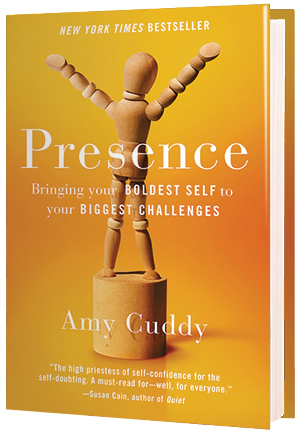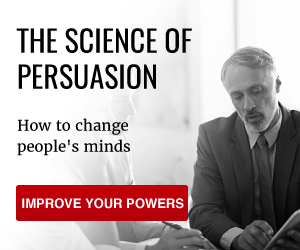 Harvard psychologist, Amy Cuddy became famous thanks to her TED talk on ‘power poses’, which has more than 35 million views on TED’s website. In her book, she takes the idea a step further. She explores the idea of ‘presence’ and how it can help you to overcome your biggest challenges, both personal and professional.
Harvard psychologist, Amy Cuddy became famous thanks to her TED talk on ‘power poses’, which has more than 35 million views on TED’s website. In her book, she takes the idea a step further. She explores the idea of ‘presence’ and how it can help you to overcome your biggest challenges, both personal and professional.
What is presence? Cuddy defines it as:
‘The state of being attuned to and able to comfortably express our true thoughts, feelings, values, and potential.’
The main thrust of the book is that by employing power poses and other small psychological nudges, we can master presence and therefore perform better in interviews, meetings, presentations, public speaking events – or any other stressful challenge we might face.
Our view of Presence
There’s nothing ground breaking here, and if you’ve watched Cuddy’s TED talk, you’ll recognise some of the material. That’s not to say, however, that there isn’t some interesting and practical content in Presence.
Quite a bit of the book is taken up with Cuddy’s personal anecdotes, snippets from interviews she’s done (ranging from a successful financier to author Neil Gaiman), and stories she’s been sent from people who have been inspired by her work. These episodes are good at demonstrating how widespread feelings of inadequacy and ‘imposterism’ are, even among conventionally successful people. They’re not necessarily examples you can learn much from however.
Where the book comes into its own is in the accounts of the studies about presence and power. There’s no new research here, but Cuddy provides a good overview of recent findings in her area of social psychology.
One study, for example, found that the best predictors of who got the money at venture capitalist pitches were not the person’s credentials or the content of the pitch. Rather is was their confidence, comfort level and enthusiasm. These traits signal how much you truly believe in the value and integrity of your idea. They also indicate your ability to bring it to fruition.
Another study Cuddy recounts found that the larger the device we work on – ranging from smartphone to desktop – the more assertive we are. The finding that mobile technology may be reducing the very empowerment it’s meant to promote has interesting connotations for the purported benefits of this megatrend in the workplace.
Is it worth my time?
Presence leans a great deal on anecdote, and it runs a little long for such a simple premise. However, the lessons Cuddy draws from her recent research somewhat make up for this, providing thought-provoking fodder for those wanting to up their presence in socially stressful situations.
- Title: Presence: Bringing Your Boldest Self to Your Biggest Challenges
- Author: Amy Cuddy
- Length: 352 pages
- Publisher: Orion
- Price: On Amazon: Hardback – £13.60; Kindle – £9.99; Paperback – £8.99 (released 29 December 2016)
